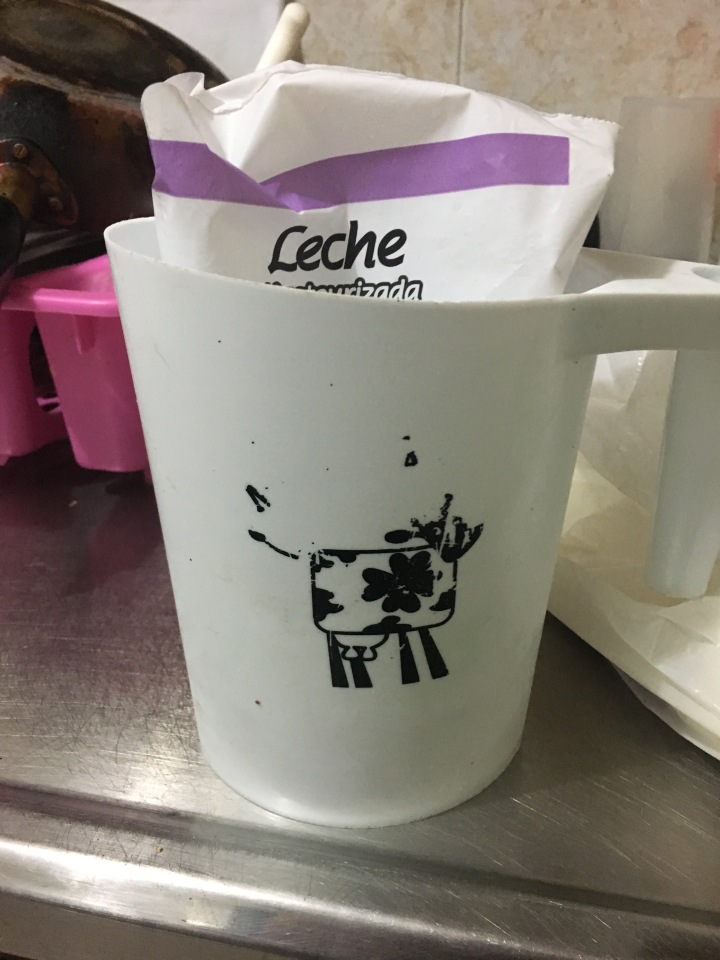The past few weeks have been slow—as classes and finals are over, I’ve only had a sprinkling of little events and summer classes to run and attend. But of course, instead of using my time to take a day trip, plan vacation travels or find a new favorite café, I binge-watched both seasons of Stranger Things. #BeFulbright.
While I was being a useless coach papa, I also found myself trying to put a finger on something that I think a lot about: culture shock. We all know what it is, and for me it’s been something that comes in waves, with one week feeling like I am a full-fledged paisa and the next feeling like it could be my first week here. But I think actually naming what those little shocks are, and why they shock us, is a lot more difficult. So here’s a list, ranging from the superficial to a little more complex, of what I think have been my causes of culture shock.
Food product packaging & food in general.
As I’ve said before, there are a lot of liquid items here that come in bags—water, milk, yogurt, for example—and I still haven’t really gotten used to it! You generally keep the milk in these little pitchers so that you can store them upright in the refrigerator and pour it easily.

In the beginning, buying food in general, particularly fruits and vegetables, were a constant reminder of my foreignness. In the fruit tiendas there are peppers that come in all shapes, sizes, and colors rather than solid red and green. It took me about two months before I figured out that spinach existed because it’s sold on the vine-like stem it grows on rather than already picked and packaged like in the U.S. My vegetables also always seem to continue “sprouting” after I’ve bought them and go bad pretty quickly, which means that instead of buying my fruits and vegetables for the week, I tend to restock every few days. Luckily it’s all pretty cheap and easily available!

Paying for (most) things in cash only.
Other than the stores and restaurants in the mall and a select few, generally swankier locations, everything is cash only. This one took a while to get used to, as it was difficult to figure out how much money to carry for a particular situation, and I dreaded having to break a $50COP bill when all I was buying was a box of pasta. I go back and forth between liking this element of life here and being frustrated by it, but I do feel like always paying in cash makes me more aware of how quickly or slowly I’m spending money.
General knowledge of the way things work.
There’s nothing that makes you feel more like a blubbering extranjera than realizing you don’t know what to do in a simple situation. My first day in Rionegro when I went out to lunch, I didn’t know how the menu del día—the fixed menu that varies amongst restaurants—works. Frijoles o sopa? Pollo, carne, chicharrón? Jugo de mango, guanabana, lulo, mora? The waitress rattled off the options and I felt like a student who sees the first question of the test and looks at everyone else to see if they look just as panicked. Making doctors appointments, paying bills, and figuring out which combinations of buses to get in order to reach your destination are all things to which I am constantly adjusting.
Informality.
In general, the rules of professionalism are more relaxed here. This varies from person to person, but it isn’t uncommon for students to WhatsApp their teachers instead of emailing them. At first when students invited me to coffee I was hesitant to accept, but I soon realized that this is very normal. A few of my classes even had Facebook groups to communicate and for teachers to share assignments and reminders. I don’t know if I’ll ever get totally used to this, but I definitely enjoy the more relaxed mentality of what constitutes professional relationships.
Concept of time.
This is the most difficult for me to really define, so bear with me. My community where I grew up in the U.S. had a very time-conscious mentality. Everyone has lists of what they need to accomplish every day, and we thrive on time efficiency—the most efficient way to get somewhere or complete some task. There was always this sense of urgency, and a having a good day, at least for me, really meant having a productive day. People say that Latin America has a “slower pace of life,” but I think that phrase is a little misleading—in Colombia, the work days are long, people go to school and work at the same time, they deal with financial and familial stressors. It’s not that life is necessarily simpler here, but I think the difference in the pace of life that people feel is the idea of what counts as valuable use of time. The first line of every text I receive is usually some variation of the following: Hola, buenos días, cómo estás?/Hi, good morning, how are you? Even if the ultimate goal of the text is to ask a simple question that could have resulted in a 30-second text exchange, this custom of politeness is always maintained. In-person communication is often more effective than sending emails, which takes more time because you have to get yourself to the office or store to ask your question. Unlike in the U.S. where the campus Starbucks was always filled with students drinking coffee to fuel a cramming session, the majority of cafés don’t have Wifi or outlets, so people sit and actually talk to each other. Strange.
This difference in the concept of what is considered a valuable use of time doesn’t seem that big, but it has by far been the hardest to adjust to. The most frustrating thing about this is that I find myself angry when something seems to take a long time. And I’m frustrated that I feel angry because that means that I’m feeling like whatever way that I think things should be done is the right way. And it’s not. That’s just my own ethnocentrism staring me in the face. Not one way is right or wrong, but they clash, and it’s a clashing that constantly reminds me that 1. I’m out of my element and 2. I’m not quite as open-minded as I want to be. Of course, this is all part of the experience of not just traveling abroad but living and working abroad. And while sometimes it’s frustrating, it’s also refreshing—if I need help with something someone is always willing to help me, whereas in the U.S. I’d be just as likely to be told that I don’t have time right now.
I think my attempt to define culture shock just made me even more confused, but I hope they made some sense!

